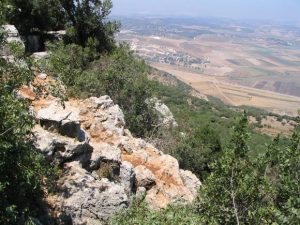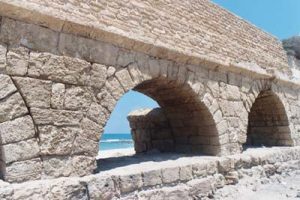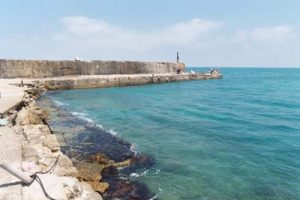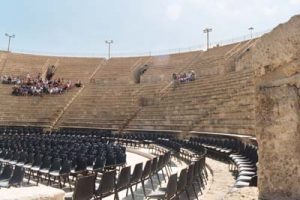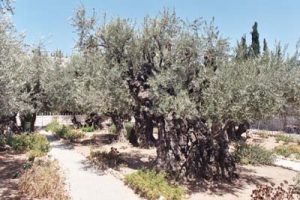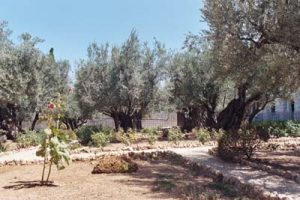by Bruce Okkema
O Lord, God of Abraham, Isaac and Israel, let it be known today that you are God in Israel and that I am your servant and have done all these things at your command. Answer me, O Lord, answer me, so these people will know that you, O Lord, are God, and that you are turning their hearts back again. – 1 Kings 18:36-37
Approximately 60 years after the death of King Solomon, Ahab was reigning king of the northern kingdom. Solomon’s sons, Rehoboam and Jeroboam, had split the kingdom in two. In the interest of forming a political alliance with the Canaanites of his area, Ahab married Jezebel, daughter of the king of Phoenicia. Jezebel was a priestess of the god of Baal and his cohort, Asherah. When she came to live in the palace, she brought with her 450 prophets of Baal and 400 of Asherah and, through Ahab, she established her religion as the national religion of Israel. She tried to kill all of the prophets of the Lord. The scripture says:
There was never a man like Ahab, who sold himself to do evil in the eyes of the LORD, urged on by Jezebel his wife. (I Kings 21:25) (Please read the entire account in 1 Kings 16-19 to get a sense for the contrasting experiences pictured above.)
The scene is Mt. Carmel, the highest place of Baal worship. Baal was the god of the storm, thunder, lighting, and rain; Baal and Asherah together were considered the gods of fertility. For Elijah to proclaim the withholding of dew and rain was to declare Baal impotent and powerless. This infuriated Ahab and Jezebel to the extent that Elijah had to go into hiding for his own preservation. When the Lord called Elijah again to confront Ahab, he chose to give the prophets of Baal every advantage – the site being Baal’s own place of worship and the method being his own “fire from heaven.”
After a whole day of chanting, self-mutilation, and Satanic ritual, it was time for the prophets of Baal to turn the stage over to Elijah. He prayed to the Lord, and in a word, the true God of Israel, delivered lightning and thunder, he destroyed the prophets of Baal and Asherah, and then he sent rain on the land.
We are surprised to read next that we find Elijah running for his life and he wants to die. He said, “Lord, I have had enough … take my life; I am no better than my ancestors” (I Kings 19:4-5). How could this be? He had been miraculously fed by ravens, provided an unending supply of oil and flour in Zarephath, raised a boy from the dead, and now had seen the awesome display of God’s power in the defeat of Baal. Yet he says,
“I have been very zealous for the LORD God Almighty. The Israelites have rejected your covenant, broken down your altars, and put your prophets to death with the sword. I am the only one left, and now they are trying to kill me too.” (1 Kings 19:14)
The people of Israel needed to see the lightning bolts, but Elijah needed encouragement. He thought he was serving the Lord all by himself. God met him where he was and sent his angel to comfort him. He then took Elijah to Mt. Sinai to remember his covenant and teach him more about himself. Elijah, we know, eventually passed on his great spirit to Elisha and the Lord took Elijah to himself without passing through death.
Where ever you are serving the Lord, at times you will become discouraged. We naturally expect that our obedience to him will lead to things going well in our lives. Sometimes they will, but more often than not, they will not. The Enemy will always be trying to thwart the purposes of the Lord and to discourage us in the process. The constant battle between the forces of Satan and the forces of God is always around us and we are involved. It is important to share our troubles with the community of believers so we can know each other’s needs and how to pray together for strength and direction. The Lord never allows all of us to be under attack at the same time. When we do share, we find that we don’t have to face our problems alone and there is light at the end of the tunnel that we were unable to see.
Maybe you are in a situation where you are under attack. People are trying to destroy your family, the economy is destroying your business, your money is gone, loneliness is turning your thoughts inward, or maybe people are even trying to kill you for your faithfulness. Hold onto the story of Elijah. God never abandons us. He is always watching over us; when we cry out to him, he hears. He rarely works things out the way we expect him to, but he always does, and when our work on earth is finished, he will take us to himself.
The steep cliffs of Mt. Carmel overlook the Jezreel valley and the plains of Megido.

